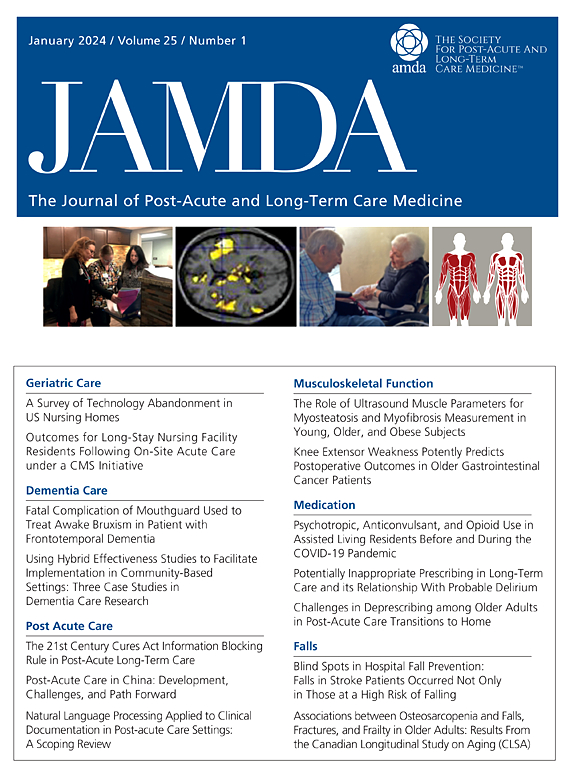Reliability and Validity of the New Urgency Classification Model for Acute Medical Care in Dutch Nursing Home Setting
IF 3.8
2区 医学
Q2 GERIATRICS & GERONTOLOGY
Journal of the American Medical Directors Association
Pub Date : 2024-09-16
DOI:10.1016/j.jamda.2024.105268
引用次数: 0
Abstract
Objective
To validate an Urgency Classification Model developed for telephone triage in Dutch nursing homes.
Design
Retrospective observational study.
Setting and Participants
Retrospective analysis of triage data of nursing home residents in a medical service organization, active in 40 nursing homes across the Netherlands.
Methods
An Urgency Classification Model for nursing home care was developed through a collaborative cocreation session by modifying existing acute medical care delivery models. All inquiries to central triage personnel during regular working hours between April 1 and April 30, 2022, were retrospectively categorized according to the new Urgency Classification Model (“urgency,” consisting of 6 levels from U0 to U5; and “goals of care and treatment limitations,” consisting of 4 options) by 2 independent physicians to evaluate the reliability using Cohen's kappa. To ascertain validity, the categorized data were juxtaposed with the executed treatment plan as documented in the patient records.
Results
Of 387 inquiries, consensus between assessors using the Urgency Classification Model was reached upon initial independent classification of urgency in 77.0% (n = 298, Cohen's kappa 0.654) of cases and in 77.3% (n = 299, Cohen's kappa 0.649) of goals of care and treatment limitations classification, representing substantial interrater reliability. A strong positive correlation was found between the urgency identified through the Urgency Classification Model and the observed urgency in the executed treatment, rs = 0.662, P < .001; the same urgency was given in 71.5% (n = 276) of all inquiries. Overtriage (meaning the model classified the inquiry as more urgent than the executed treatment plan) occurred in 9.8% (n = 38) and undertriage in 18.7% (n = 72).
Conclusion and Implications
The new Urgency Classification Model is a valid and reliable classification tool for implementation within its intended target population. Universal and comprehensive implementation is expected to lead to more appropriate care delivery, while realizing integration with the acute medical care frameworks already in place.
荷兰养老院急症医疗护理新急症分类模型的可靠性和有效性。
目的: 验证为荷兰养老院电话分诊开发的紧急状况分类模型:验证为荷兰养老院电话分流开发的紧急状况分类模型:设计:回顾性观察研究:对一家医疗服务机构的养老院居民分流数据进行回顾性分析:方法:通过修改现有的急诊医疗服务模式,在一次合作共创会议上开发出了养老院护理急诊分类模式。在 2022 年 4 月 1 日至 4 月 30 日的正常工作时间内,由两名独立医生根据新的急诊分级模型("急诊 "包括从 U0 到 U5 的 6 个级别;"护理目标和治疗限制 "包括 4 个选项)对所有向中央分诊人员提出的询问进行了回顾性分类,并使用科恩卡帕评估其可靠性。为确定有效性,将分类数据与患者病历中记录的已执行治疗计划并列:在 387 例问诊中,77.0% 的病例(n = 298,Cohen's kappa 0.654)和 77.3%的病例(n = 299,Cohen's kappa 0.649)的护理目标和治疗限制分类中,评估者之间在使用急诊分类模型进行初步独立急诊分类后达成了共识,这表明评估者之间的可靠性很高。通过急迫性分类模型确定的急迫性与执行治疗中观察到的急迫性之间存在很强的正相关性,rs = 0.662,P < .001;71.5%(n = 276)的问询具有相同的急迫性。9.8%(n = 38)的问询发生了 "过分类"(即模型将问询分类为比已执行的治疗计划更紧急),18.7%(n = 72)的问询发生了 "欠分类":新的紧急程度分类模型是一种有效、可靠的分类工具,可在其目标人群中实施。普遍而全面的实施有望带来更适当的护理服务,同时实现与现有急症医疗护理框架的整合。
本文章由计算机程序翻译,如有差异,请以英文原文为准。
求助全文
约1分钟内获得全文
求助全文
来源期刊
CiteScore
11.10
自引率
6.60%
发文量
472
审稿时长
44 days
期刊介绍:
JAMDA, the official journal of AMDA - The Society for Post-Acute and Long-Term Care Medicine, is a leading peer-reviewed publication that offers practical information and research geared towards healthcare professionals in the post-acute and long-term care fields. It is also a valuable resource for policy-makers, organizational leaders, educators, and advocates.
The journal provides essential information for various healthcare professionals such as medical directors, attending physicians, nurses, consultant pharmacists, geriatric psychiatrists, nurse practitioners, physician assistants, physical and occupational therapists, social workers, and others involved in providing, overseeing, and promoting quality

 求助内容:
求助内容: 应助结果提醒方式:
应助结果提醒方式:


